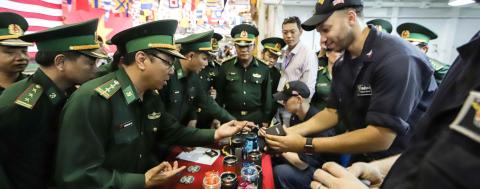This week the Lowy Institute's International Security Program, supported by the Korea Foundation, is hosting the Australia-Republic of Korea (ROK) Emerging Leaders International Security Forum in Sydney and Canberra, bringing together scholars and future policymakers focused on the bilateral security relationship. This is the first in a series of posts from Forum participants.
The world as we know it is experiencing fundamental change. This is particularly true in the Indo-Pacific region, where two variables are providing a significant challenge to the familiar security-economic operating system that defines the parameters of our known world – the rise of China and strategic uncertainty about the course of US foreign policy under President Donald Trump.
In the security domain, China continues to assert its strategic and military presence, especially in the South China Sea. The Philippines' legal victory at the Permanent Court of Arbitration last July has failed to deter China’s activities in the South China Sea, where Beijing continues to build up its artificial facilities and to display, through military exercises, its existing and new capabilities such as the Liaoning aircraft carrier. Simultaneously, China is providing significant economic assistance to particular Southeast Asian countries, such as the Philippines and Malaysia, while attempting to mend its relationship with Vietnam through high level exchanges. But China’s economic assistance to Southeast Asia is just one part of its One Belt One Road vision, which goes beyond economic statecraft to provide a geopolitical, or geo-economic alternative, to existing regional and global governance.
China has every right to secure its strategic and economic interests. But the intent underlying its initiatives – to promote a Chinese alternative to the US-led international order – raises big questions for many of its neighbours. What is the Chinese alternative to the existing regional operating system (ROS) that has been the basis of the region’s peace and prosperity since the Second World War? Do we have faith and confidence in Beijing’s motives? Can China assure other regional countries that a Chinese alternative would safeguard their interests?
At the other end of the spectrum is the US. As Kurt Campbell argues in The Pivot, the US not only built the existing international order and regional operating system but has operated as its lynchpin since its inception. Of course, Washington did not build and operate this system purely out of altruistic intent. The system has served US interests as well. The US has provided security assurances to the region, championed free trade and open markets and buttressed several economies in the region, especially during the Cold War. Peace, democracy, free trade, and open economies have provided the fundamental base for the existing ROS underpinned by the US. Regional countries have largely benefitted from the system, although to varying degrees.
Now there are growing doubts about the role of the US as a defender of the system, especially since the election of Donald Trump. Will Trump’s America remain the defender of the existing order? More to the point, can he abandon those election promises which contradict the existing order and system? Will the long-touted declinist argument finally come to fruition? Perhaps, if not a complete decline, could it be part of a long-term downward trend for the US? Neither the US nor China have clear answers to these questions. Meanwhile, the competition between the two powers is increasing strategic tension, uncertainty, and dilemmas in the region.
At this juncture, we have to ask ourselves: can we afford to simply say things are going to be alright? Can we risk the deterioration or collapse of the ROS? Can we place our interests in the hands of others? The regional system we have today has brought peace, security, and economic prosperity to many regional countries. Without it, this peace and prosperity will come under threat.
Because of Sino-US power rivalry, regional countries have been in a strategic dilemma for the past ten years. Now they have to decide who can best serve their security and economic interests. There are three possible scenarios for a power rivalry: a dispute that turns the region into a battlefield; continuing tension that will subject regional countries to enduring strategic uncertainty; or a compromise that results in two spheres of influence. None of these scenarios are acceptable for regional countries.
Australia and South Korea must come together to safeguard the existing ROS and the interests of small and medium regional powers. Why is an Australia-South Korea partnership important? As likeminded 'constructive' middle powers, both have a similar strategic outlook. Both are committed to a rule based international and regional order, open economy with free trade, and universal values such as democracy and human rights. Australia and South Korea are partners in regional multilateral institutions including the ASEAN Regional Forum, East Asia Summit, and Regional Comprehensive Economic Partnership. Moreover, Australia is one of only two countries with which South Korea has a 2+2 partnership. Finally, both Australia and South Korea are capable of economically, militarily, and politically contributing to the whole region and are willing to do so.
What do Australia and South Korea have to do to reduce strategic uncertainty and maintain the existing ROS? First, the 2+2 should be further expanded, as a vital platform for furthering Australia-South Korea cooperation across a broad policy spectrum (peacekeeping, defence exercise, education and training, defence science, non-proliferation, cyber security, police cooperation, border protection, maritime security and safety). Currently, the 2+2 focuses mainly on promoting functional cooperation, although the 'public goods' of cooperation are shared regionally. What is missing is a strategic discussion, consultation, and consensus on the landscape of the region; the central themes of which are the maintenance of the security and the economic futures through the ROS, as well as the impact of US-China relations.
Second, the two countries have to seriously foster strategic networks among regional small and medium powers. It is time for small and medium powers to go beyond either the existing US-led hub and spoke system or the Chinese alternative system whether it is OBOR or something else. While maintaining the existing relations with the US and China, small and medium regional powers have to form a denser, more interconnected, network of strategic cooperation. Australia’s National Security College recently published a report, calling for a resilient web of allies and partners in the region. I agree that we have to build an effective consultation and cooperation network among spoke countries in the region, but one which includes consideration of China. This is an advanced hedging strategy for small and medium regional powers that will not only secure and strengthen their interests, but also promote regional multilateralism.

